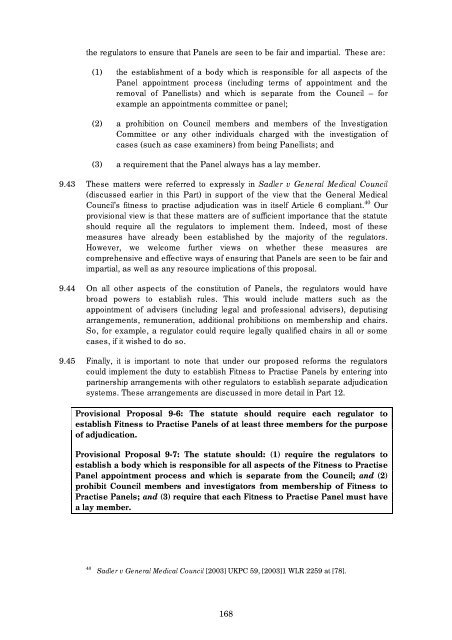Regulation of Health and Social Care Professionals Consultation
Regulation of Health and Social Care Professionals Consultation
Regulation of Health and Social Care Professionals Consultation
You also want an ePaper? Increase the reach of your titles
YUMPU automatically turns print PDFs into web optimized ePapers that Google loves.
the regulators to ensure that Panels are seen to be fair <strong>and</strong> impartial. These are:<br />
(1) the establishment <strong>of</strong> a body which is responsible for all aspects <strong>of</strong> the<br />
Panel appointment process (including terms <strong>of</strong> appointment <strong>and</strong> the<br />
removal <strong>of</strong> Panellists) <strong>and</strong> which is separate from the Council – for<br />
example an appointments committee or panel;<br />
(2) a prohibition on Council members <strong>and</strong> members <strong>of</strong> the Investigation<br />
Committee or any other individuals charged with the investigation <strong>of</strong><br />
cases (such as case examiners) from being Panellists; <strong>and</strong><br />
(3) a requirement that the Panel always has a lay member.<br />
9.43 These matters were referred to expressly in Sadler v General Medical Council<br />
(discussed earlier in this Part) in support <strong>of</strong> the view that the General Medical<br />
Council’s fitness to practise adjudication was in itself Article 6 compliant. 40 Our<br />
provisional view is that these matters are <strong>of</strong> sufficient importance that the statute<br />
should require all the regulators to implement them. Indeed, most <strong>of</strong> these<br />
measures have already been established by the majority <strong>of</strong> the regulators.<br />
However, we welcome further views on whether these measures are<br />
comprehensive <strong>and</strong> effective ways <strong>of</strong> ensuring that Panels are seen to be fair <strong>and</strong><br />
impartial, as well as any resource implications <strong>of</strong> this proposal.<br />
9.44 On all other aspects <strong>of</strong> the constitution <strong>of</strong> Panels, the regulators would have<br />
broad powers to establish rules. This would include matters such as the<br />
appointment <strong>of</strong> advisers (including legal <strong>and</strong> pr<strong>of</strong>essional advisers), deputising<br />
arrangements, remuneration, additional prohibitions on membership <strong>and</strong> chairs.<br />
So, for example, a regulator could require legally qualified chairs in all or some<br />
cases, if it wished to do so.<br />
9.45 Finally, it is important to note that under our proposed reforms the regulators<br />
could implement the duty to establish Fitness to Practise Panels by entering into<br />
partnership arrangements with other regulators to establish separate adjudication<br />
systems. These arrangements are discussed in more detail in Part 12.<br />
Provisional Proposal 9-6: The statute should require each regulator to<br />
establish Fitness to Practise Panels <strong>of</strong> at least three members for the purpose<br />
<strong>of</strong> adjudication.<br />
Provisional Proposal 9-7: The statute should: (1) require the regulators to<br />
establish a body which is responsible for all aspects <strong>of</strong> the Fitness to Practise<br />
Panel appointment process <strong>and</strong> which is separate from the Council; <strong>and</strong> (2)<br />
prohibit Council members <strong>and</strong> investigators from membership <strong>of</strong> Fitness to<br />
Practise Panels; <strong>and</strong> (3) require that each Fitness to Practise Panel must have<br />
a lay member.<br />
40 Sadler v General Medical Council [2003] UKPC 59, [2003]1 WLR 2259 at [78].<br />
168
















